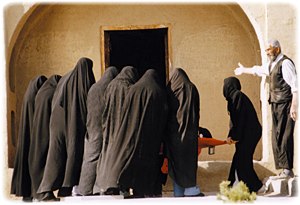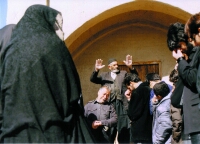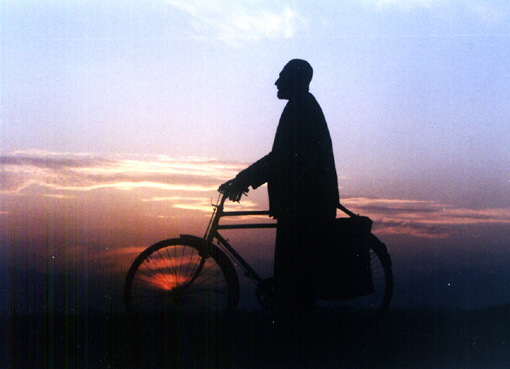Bitter Dream - Khab-e talkh (2004)
Synopsis
For forty years, Esfandiar has been unconcernedly preparing corpses for the journey to their final resting place. One day, whilst preparing a burial service, he's taken ill. Might he too be mortal ? -- IMDb
Cast:
Yadollah Anvari, Abbas Esfandiari, Delbar Ghasri, Mohsen Rahimi, Safar-Ali Safari

*****
Illustrating both the diversity of current Iranian filmmaking and the loosening ties of State censorship, this scabrous black comedy takes a theme straight out of Dickens' A Christmas Carol - visited by the angel of death, a spectacularly bad-tempered funeral director attempts to make amends to his many enemies and victims, before his own imminent demise - and turns it into a meditation on mortality and a satire on the intractability of human nature, since Mr Esfandier (our supposed hero) is too old and too stubborn to ever quite repent.
Funny and quietly subversive, it's another welcome envoy from an extraordinarily vital film culture.
*****
An Iranian comedy: who would have thought? We've come a long way in the past decade or so, from art movies of exquisite delicacy and restraint, through the wry, finely-tuned ironies of mid-period Kiarostami and Makhmalbaf, to this - the first feature from Mohsen Amiryoussefi.
And if the result is not actually laugh-out-loud funny - more a kind of sustained amusement, flecked with moments of deadpan absurdity - then that is perhaps to be expected. For this film, no less than those which preceded it, is operating under a strict set of cultural conventions.

The setting is an ancient town called Sedeh in central Iran, where an 800-year-old cemetery sits outside a crumbling mosque. Here, crotchety Mr Esfandiar has performed the same job for decades: washing the bodies of the dead.
Not the female corpses, of course - that duty falls to Selbar, a widow with whom he conducts a dignified, if slightly frosty relationship - but the men: cleaning and anointing them prior to interment.
In this small workshop, Esfandiar rules with an iron fist, forever haranging and abusing his staff (in particular, an opium-smoking gravedigger - a stoner straight out of a Cheech & Chong flick), and dealing, with barely disguised irritation, with the perfidy of the living, whose sole earthly purpose seems to involve cheating him out of his rightful fee.
The irony is that, for all his bluster, his inflated sense of self, Esfandiar is no less an outcast than the rest of his staff. All are untouchables, exiled from the mainstream of Iranian society by the nature of their profession.

He's also old, well into his seventies, and as such, nearing the time of his own passing - a fact that's brought home with a bang when, in the midst of a funeral ceremony, he believes himself to have been visited by Azrael, the angel of death.
Spooked into recognition of his own mortality, Esfandiar attempts to make amends to those he has mistreated, and prepare for the big sleep ahead.
Though its rules and customs inform every frame of this narrative, writer-director Amiryoussefi is noticeably careful never to actually mention Islam, presumably for fear of attracting the heavy hand of the authorities.
Instead, his approach is strictly Brechtian: the TV interviews which open the film, intrusive at first, soon become a kind of conscience, actively lecturing Esfandiar on his failings and misdeeds, and even, at one point, showing his own funeral.
Most remarkably, we are given glimpses of a society underground: bathing pools of perfect stillness, burial chambers shrouded in deep shadow. A world beneath the world that is, tellingly, the very opposite of heaven - though no less seductive for that. (Summary from Edinburgh International Film Festival)
***
IF YOU’RE in the mood for an Iranian cemetery workers’ comedy - and how could you not be? - Bitter Dream is the film for you. Set in the ancient township of Sedah, this debut effort from young director Mohsen Amiryoussefi unfurls like a particularly droll, bemused take on A Christmas Carol.
Mr Esfandiari (Abbas Esfandiari ) is the top dog at a local cemetery where he has been washing the bodies of the dead for 40 years - a necessary ritual that prepares the souls for the next life.
His longevity in the profession has given him a kind of grouchy superiority and he has little time for the antics of his staff, spying on them and treating them badly.
However, after he receives a visit from Azreal, the angel of death, he is scared into amending his ways before it’s too late.
Amiryoussefi sets the quirky tone with his opening scene. As a TV news reporter interviews the cemetery workers about their job, each of them mocks Esfandiari for their ill-treatment at his hands. Unaware that the broadcast is going out live, one of them suddenly gets a phone call from their boss as he watches at home.
It’s a funny moment, but it also sets up one of the film’s best ideas, as Esfandiari’s TV frequently becomes the mode by which his conscience speaks to him.
Although Bitter Dream could hardly be described as hilarious, fans of Iranian cinema should get a kick out of seeing something that is lighter on its feet than the usual politically charged efforts that make it to our cinemas.
Anyone else looking for a gentle introduction to the country’s burgeoning film scene could do worse than start here. (Summary by Alistair Harkness )
|
.jpg)
Read about this film
Title: Bitter Dream - Khab-e talkh (2004)
Directed by: Mohsen Amiryoussefi
Date of birth: 23 February 1972, Abadan, Iran
Writing credits:
Mohsen Amiryoussefi
Country: Iran
Language: Farsi
Color: Black and White | Color
Runtime: 87 min.
|

